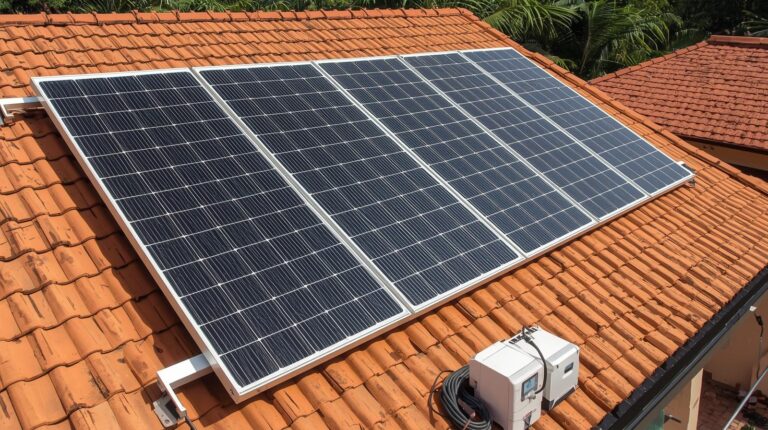Looking to harness the power of the sun and take control of your energy usage? Look no further than solar battery storage options.
This invaluable resource will walk you through everything you need to know about solar battery storage, from the different types of batteries available to the factors to consider when selecting the right one for your needs.
Discover how solar battery storage can revolutionize your energy consumption, increase your energy independence, and potentially save you money.
With so much to gain, it’s time to take the first step towards a brighter, more sustainable future.
Key Takeaways
- Lithium-ion batteries offer high energy density and long lifespan, making them versatile and efficient for solar energy storage.
- Lead-acid batteries are a reliable and cost-effective option for solar energy storage, commonly used in off-grid systems but requiring regular maintenance.
- Flow batteries are highly scalable and durable, ideal for large-scale energy storage needs.
- Saltwater batteries are eco-friendly, safe, and potentially offer longer-lasting storage solutions for residential and commercial applications.
Lithium-ion Batteries
Lithium-ion batteries, known for their high energy density and long lifespan, are a compact and efficient option for storing solar energy. These reliable batteries, such as the LG RESU Prime and Tesla Powerwall, provide superior performance in solar battery storage systems.
With minimal maintenance requirements, they’re a convenient choice for both residential and commercial setups. The lightweight and versatile nature of lithium-ion batteries makes them suitable for various applications in solar energy storage.
Their high energy density allows for maximum power output in a compact size, optimizing the use of available space. With their long lifespan, these batteries offer a reliable and durable solution for storing solar energy over an extended period.
Lead-acid Batteries
Lead-acid batteries are a reliable option for solar energy storage, offering good performance in terms of capacity and power output. However, they do require regular maintenance to ensure their optimal functioning and prolonged lifespan.
The cost of lead-acid batteries is generally lower compared to newer technologies like lithium-ion, making them a cost-effective choice for certain solar power applications.
Performance of Lead-Acid
Lead-acid batteries are often chosen for their cost-effectiveness and are commonly used in off-grid solar energy storage systems. These batteries are known for their affordability, making them a popular choice for individuals looking for a cost-effective solution.
However, in order to maintain their optimal performance, lead-acid batteries require regular maintenance. Compared to lithium-ion batteries, lead-acid batteries have shorter lifespans. This means that they may need to be replaced more frequently, which can affect their overall durability and efficiency.
While lead-acid batteries are a viable option for solar energy storage, it’s important to consider their limitations and potential trade-offs. By understanding their performance characteristics, individuals can make informed decisions when choosing the right battery for their off-grid system.
Lifespan and Maintenance
When it comes to the lifespan and maintenance of batteries used for solar energy storage, certain factors need to be considered. Lead-acid batteries, commonly used for this purpose, have a typical lifespan of 3 to 5 years. To ensure optimal performance and longevity, regular maintenance is crucial. This includes checking water levels and ensuring proper ventilation.
Overcharging or deep discharging can significantly reduce the lifespan of lead-acid batteries, so it’s important to avoid these situations. One advantage of lead-acid batteries is their lower upfront cost compared to other battery types. However, to maximize their efficiency and longevity, proper maintenance practices must be followed.
Cost Considerations and Availability
Considering the cost and availability factors, lead-acid batteries provide an affordable and reliable option for solar energy storage solutions. These batteries are commonly used in off-grid solar systems due to their affordability and reliability.
While lead-acid batteries have shorter lifespans compared to other types, they are still a popular choice for certain applications. The price range for lead-acid batteries typically falls between $200 to $800 each, making them a cost-effective choice for some consumers.
However, it’s important to note that lead-acid batteries require regular maintenance to ensure optimal performance and longevity. This regular maintenance includes tasks such as checking the electrolyte levels, cleaning the battery terminals, and equalizing the battery charge.
Despite the need for regular maintenance, lead-acid batteries remain a popular choice due to their availability and affordability.
| Key Factors | Lead-acid Batteries |
|---|---|
| Cost | Affordable |
| Lifespan | Shorter compared to other types |
| Maintenance | Regular maintenance required |
| Reliability | Reliable choice for off-grid solar systems |
Flow Batteries
Flow batteries are highly scalable and well-suited for large-scale installations, offering extended discharge durations and flexibility in capacity. Here are some key points about flow batteries:
- They utilize two tanks of electrolytes to store energy, allowing for easy adjustment of capacity.
- Flow batteries are known for their durability and ability to withstand frequent charging cycles, making them suitable for long-lasting energy storage solutions.
- These batteries are ideal for high-capacity energy storage needs, providing a reliable source of power over an extended period.
- While flow batteries require more space and are relatively expensive compared to other battery options, their scalability and flexibility make them a valuable choice for large-scale installations.
Flow batteries offer a dependable and adaptable solution for those seeking high-capacity energy storage, especially in large-scale applications.
Related Post: Discover 3 Best Batteries For An Off-Grid Energy System.
Saltwater Batteries
When considering solar battery storage options, you may be curious about the differences between saltwater and lithium batteries.
Saltwater batteries have gained attention for their eco-friendly nature, using saltwater as an electrolyte instead of toxic chemicals. This makes them a safe and sustainable choice for energy storage.
In addition to their environmental benefits, saltwater batteries offer the potential for longer-lasting storage solutions, making them a reliable option for both residential and commercial applications.
Saltwater Vs. Lithium
Are you wondering which type of battery, saltwater or lithium, is the better option for your energy storage needs? Let’s explore the differences between these two options to help you make an informed decision:
- Saltwater batteries: These eco-friendly batteries use saltwater as an electrolyte, making them safe and sustainable for energy storage. They’re recyclable and pose minimal risks of fire or explosions, ensuring a safe energy storage system.
- Lithium batteries: Lithium batteries, such as lithium-ion, are known for their high energy density and longer lifespan compared to saltwater batteries. They’re commonly used in residential and commercial applications due to their reliability and performance.
- Availability and scalability: While saltwater batteries offer the potential for longer-lasting storage solutions, their availability and scalability may be limited compared to lithium batteries.
Now that you have an understanding of the differences between saltwater and lithium batteries, you can choose the one that best suits your energy storage requirements.
Benefits of Saltwater
Saltwater batteries, also known as saltwater batteries or saltwater energy storage systems, offer several key benefits for those seeking a safe and sustainable solution for their energy storage needs.
These batteries use saltwater as an electrolyte, making them eco-friendly and recyclable. They are also non-flammable, ensuring safety during operation and reducing the risk of accidents.
Saltwater batteries are considered suitable for residential use due to their non-toxic and non-hazardous composition. In addition, they have the potential for longer-lasting storage capabilities compared to some other battery types.
While still emerging, saltwater batteries show promise in providing reliable and environmentally friendly energy storage solutions.
| Benefits | Description |
|---|---|
| Eco-friendly | Saltwater batteries use a non-toxic and non-hazardous electrolyte, making them environmentally friendly. |
| Recyclable | These batteries can be recycled, reducing waste and promoting sustainability. |
| Non-flammable | Saltwater batteries are non-flammable, ensuring safety during operation and reducing the risk of accidents. |
Nickel Cadmium (Ni-Cd) Batteries
Nickel Cadmium (Ni-Cd) batteries, known for their durability and ability to withstand extreme conditions, offer a proven track record in demanding applications. These batteries have a long cycle life, making them suitable for applications requiring repeated charging and discharging.
Ni-Cd batteries are robustly constructed, making them ideal for harsh environments where other battery types may not perform well. They’re commonly used in industrial settings and emergency backup systems due to their reliability and resilience.
While not as common in residential solar setups, Nickel Cadmium batteries have been widely used in various industries for their ability to deliver consistent energy storage. With their strong durability and long cycle life, they provide a reliable solution for demanding applications that require stable electricity storage.
Lithium Iron Phosphate (LFP) Batteries
Lithium Iron Phosphate (LFP) batteries, renowned for their exceptional lifespan and eco-friendly characteristics, have become the preferred choice for reliable and efficient solar energy storage systems in both residential and commercial settings. With their longer lifespan compared to other battery types, LFP batteries offer a cost-effective solution for long-term energy storage.
These batteries are also highly eco-friendly, as they can be easily recycled at the end of their life cycle. Popular models like Franklin Home Power and Panasonic EverVolt provide excellent performance and reliability in solar energy storage applications.
Additionally, LFP batteries exhibit a high tolerance for extreme temperatures, making them suitable for various climates. Whether you’re looking for a reliable option for your home or a commercial establishment, LFP batteries offer the efficiency and reliability you need to power your solar energy system.
Frequently Asked Questions
What Are 3 Drawbacks to Storing Solar Energy in Batteries?
Three drawbacks to storing solar energy in batteries are limited energy storage capacity, battery degradation over time, and cost effectiveness. These factors can impact the overall efficiency and sustainability of the system.
What Is the Best Option for Solar Batteries?
The best option for solar batteries depends on factors such as battery efficiency, cost comparison, environmental impact, lifespan considerations, maintenance requirements, charging and discharging speed, integration with existing solar systems, backup power capacity, durability and reliability, and resale value.
How Long Will a 10kW Battery Last?
A 10kW battery’s lifespan depends on factors like energy consumption, battery efficiency, weather conditions, and battery age. Regular maintenance, proper usage, and charging and discharging cycles can extend its life.
What Is the Best Battery to Store Energy From Solar Panels?
The best battery to store energy from solar panels depends on several factors including battery capacity, lifespan, charging efficiency, cost, safety, environmental impact, maintenance, and future advancements. It is important to consider lithium-ion vs. lead-acid options.
Conclusion
In the vast landscape of solar battery storage options, like a symphony of energy solutions, each type of battery plays a unique role. From the reliable and widely used lithium-ion batteries to the robust and durable lead-acid batteries, the choices are abundant.
Flow batteries offer flexibility, while saltwater batteries provide a sustainable alternative. And let’s not forget about the dependable nickel cadmium and lithium iron phosphate batteries.
With this comprehensive guide as your compass, you can navigate the world of solar battery storage and make an informed choice that harmonizes with your energy needs.




